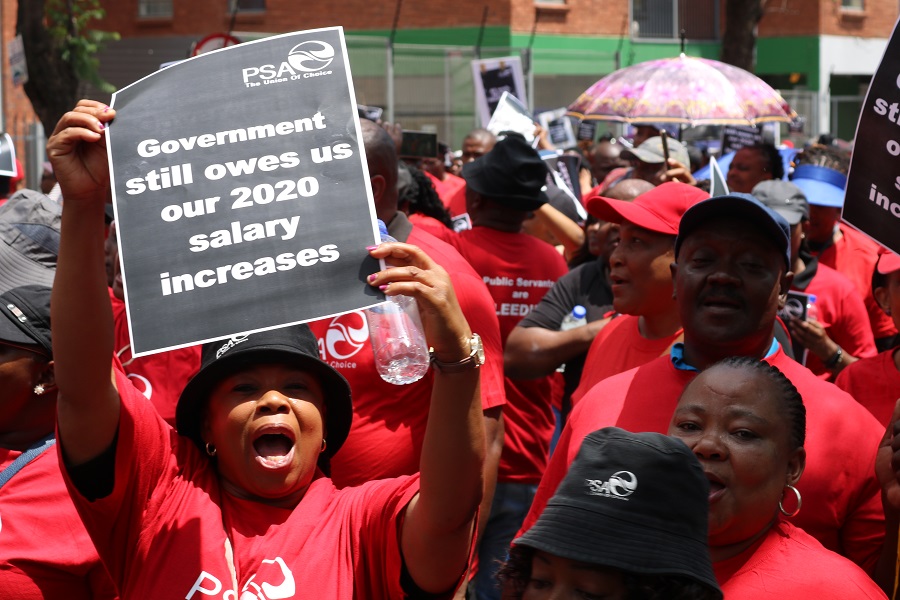South Africa will spend an additional R37.4 billion to fund public sector salary increases this year, swelling the wage bill to R730 billion and surpassing a level Finance Minister Enoch Godongwana once thought would be reached in 2025.
“The recent wage agreement has placed upward pressure on the wage bill. This means that in the current financial year, the National Treasury must identify over R37.4 billion in savings to cushion the blow on the fiscal framework,” Godongwana said on Tuesday afternoon while delivering his budget vote in parliament.
His remarks on Tuesday effectively mean the government needs an extra R37.4 billion to foot the bill for workers’ wages.
Godongwana said some of the risks to South Africa’s fiscal outlook had materialised since he tabled his February budget when he allocated R701.2 billion for the compensation of government employees.
“Key among these is the outcome of the public sector wage negotiations, which the Budget did not pre-empt,” Godongwana said.
Big adverse changes to budget
“The result is that the macro-fiscal position presented in the budget has changed adversely and significantly. The risks into the future remain high,” he said.
On Tuesday, Godongwana said the treasury, which is trying to tighten spending, now has to identify the equivalent amount (R37.4 billion) in savings to cushion the impact of the recent 7.5% wage agreement as well as to try and recover the funds it has to channel towards the increases.
“A key challenge for the fiscus is the management of the public sector wage bill,” he said.
At the end of March, the Department of Public Service and Administration (DPSA) tabled a final offer to workers, comprising a 3.3% salary hike and a 4.2% increase relating to a cash gratuity, both pensionable.
The increases came after public sector unions staged a relentless fight during wage negotiations, leading to a nationwide strike. They rejected the government’s initial increase offer after demanding 10% salary hikes.
The government, which already spends a third of its total budget compensating public sector workers, previously projected the wage bill would hit R728.7 billion during the 2023/2024 financial year, but the increases will not be without significant trade-offs, Godongwana said.
‘Headcount management’ strategies
“This will involve executing difficult trade-offs and may entail a rationalisation of staffing levels and deployment of headcount management strategies as a means to curb the wage bill,” he said.
During his budget speech in February, he cautioned against an unbudgeted wage increase warning that wage agreements that exceed the growth of the compensation budget pose a threat to public finances.
On Tuesday he reiterated that a higher-than-budgeted wage agreement means there is less space for the recruitment of staff.
He said National Treasury is working with the DPSA and provinces to coordinate a process of identifying ways to restrict headcounts to recoup funds to cover the wage increases.
National Treasury said it will not increase government borrowings for consumption expenditure, including paying for wages.
“Fiscal policy will remain focused on reducing fiscal risks and supporting measures to grow the economy. This will ensure that the overall fiscal path as outlined in the budget is maintained,” it said.
Read:
Government spending outpaces growth
For years, South Africa’s public service has been infamously bloated, and has been blamed for placing pressure on government spending.
In the previous financial year the government spent R690 billion on the wage bill that also included an additional R14.6 billion it spent to fund wage increases, following the unilateral implementation of a 3% increase in October last year.
Government spending since the 2008 financial crisis has grown faster than South Africa’s GDP growth, largely driven by a mounting public service wage bill, among other line items such as rising debt-service costs and transfers to households.
By 2026, the public wage bill is expected to increase to R760.6 billion, at an annual rate of 3.3%, signalling that government plans to curtail salary increases and keep them below inflation.
National Treasury expects inflation to average 5.3% this year, before dropping to 4.9% and 4.7% in 2024 and 2025 respectively.
Read: Public sector wage talks leave Ramaphosa in tight spot

